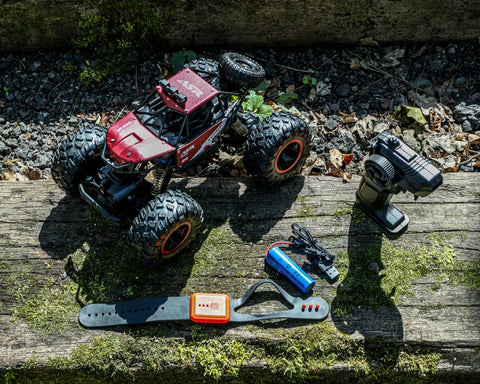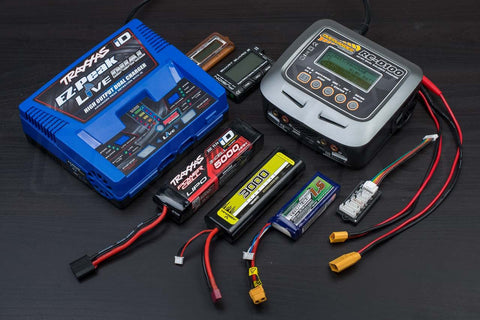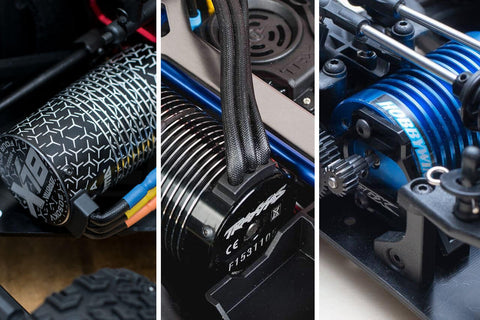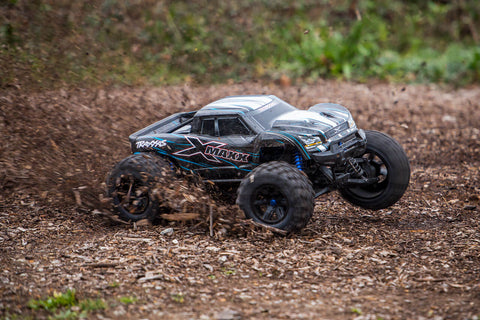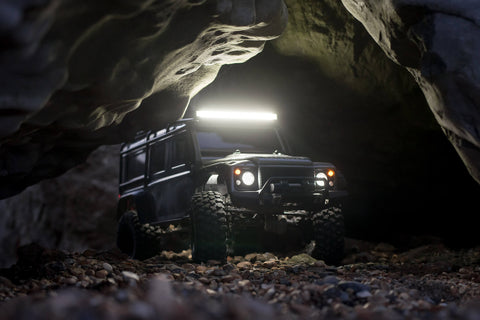There have been rumours for the past few months that DJI were close to releasing a new product, and leaks earlier this week pointed to a new quadcopter. Today on January the 23rd in New York the DJI Mavic Air was officially announced to the world. Update 30th January 2018 DJI Mavic Air White and Mavic Air Combo White in stock. DJI Mavic Air Black in stock.
 The new quick-release propellers are no longer folding, reducing complexity. Instead the arms fold the motors toward the centre-point of the drone, as seen in other folding models such as the Dobby. The identification lights are now on the arms and the rear of the drone. The front arms also feature folding landing gear that double up as the antenna housing.
The new quick-release propellers are no longer folding, reducing complexity. Instead the arms fold the motors toward the centre-point of the drone, as seen in other folding models such as the Dobby. The identification lights are now on the arms and the rear of the drone. The front arms also feature folding landing gear that double up as the antenna housing. 
 The drone takeoff weight is a svelte 430g and with the all new motors it will hit 42.5mph in sport mode (only available when flying with the transmitter) 2.5mph faster than its big brother, the Mavic Pro thanks to the new powertrain.
The drone takeoff weight is a svelte 430g and with the all new motors it will hit 42.5mph in sport mode (only available when flying with the transmitter) 2.5mph faster than its big brother, the Mavic Pro thanks to the new powertrain.
 Alongside the 12MP stills, it also offers a 32MP spherical panorama shot system that is said to produce some stunning images. Note that the system uses an algorith to calculate the sky as the gimbal does not allow the camera to point upwards. This combined with the DJI goggles should give a great immersive way to review your media.
Alongside the 12MP stills, it also offers a 32MP spherical panorama shot system that is said to produce some stunning images. Note that the system uses an algorith to calculate the sky as the gimbal does not allow the camera to point upwards. This combined with the DJI goggles should give a great immersive way to review your media.

 Here in the office the sleek and stealthy black model seems to have more fans than the red or white finishes. As with the Spark its unlikely that the coloured parts will be user-changable (unless you wish to invalidate your warranty) so be sure on your colour decision before you hit buy!
Here in the office the sleek and stealthy black model seems to have more fans than the red or white finishes. As with the Spark its unlikely that the coloured parts will be user-changable (unless you wish to invalidate your warranty) so be sure on your colour decision before you hit buy!
 Whilst we are yet to get our hands on the drone and run our own tests (particularly on image quality) on paper the Mavic Air is an impressive piece of kit. If you are a consumer looking for the ultimate image quality, then the larger sensor and lens of the Phantom 4 Pro might be more suitable if more expensive. We reserve our final opinion until we have a chance to fly this new unit against its older brother.
Whilst we are yet to get our hands on the drone and run our own tests (particularly on image quality) on paper the Mavic Air is an impressive piece of kit. If you are a consumer looking for the ultimate image quality, then the larger sensor and lens of the Phantom 4 Pro might be more suitable if more expensive. We reserve our final opinion until we have a chance to fly this new unit against its older brother.
 Also available is the ever popular 'Fly More Combo' which includes all of the above plus two extra intelligent flight batteries (totalling 3), another two pairs of propelllers (6 in total) a battery charging hub, a battery to power bank adaptor and a travel bag. The 'Fly More Combo' retails for £949 and is available in Red and Black too.
Also available is the ever popular 'Fly More Combo' which includes all of the above plus two extra intelligent flight batteries (totalling 3), another two pairs of propelllers (6 in total) a battery charging hub, a battery to power bank adaptor and a travel bag. The 'Fly More Combo' retails for £949 and is available in Red and Black too.  DJI are also offering the Mavic Air bundled with the DJI goggles. You can pick up the standard package with the DJI Goggles (Standard edition) for £1128, or go all in for the 'fly more combo' Mavic Air with the DJI Goggles (Standard edition) for £1308. Aside from this we have some early information regarding the cost of Mavic Air accessories. The all new intelligent flight batteries will cost £69 each, the charging hub £39 and the car charger £49. If you lose both pairs of transmitter sticks they will be £9 to replace, misplace the gimbal protector and its £9 to buy. Crash your drone and quick release propellers are £8 a pair whilst smashing up your propeller guards will cost you £14 a pair to swap out.
DJI are also offering the Mavic Air bundled with the DJI goggles. You can pick up the standard package with the DJI Goggles (Standard edition) for £1128, or go all in for the 'fly more combo' Mavic Air with the DJI Goggles (Standard edition) for £1308. Aside from this we have some early information regarding the cost of Mavic Air accessories. The all new intelligent flight batteries will cost £69 each, the charging hub £39 and the car charger £49. If you lose both pairs of transmitter sticks they will be £9 to replace, misplace the gimbal protector and its £9 to buy. Crash your drone and quick release propellers are £8 a pair whilst smashing up your propeller guards will cost you £14 a pair to swap out.  The carry case is £29 and the fancy travel bag that is included with the fly more combo ([pictured above) costs £69.
The carry case is £29 and the fancy travel bag that is included with the fly more combo ([pictured above) costs £69.
What is new with the Mavic Air?
Yes the new drone is called a Mavic and it has folding arms, but this is largely where the similarities stop. This is an all new drone from the air frame up, the headline features include:- New truly pocket-sized portable folding design
- 21 minute flight time and 42.5mph max velocity
- 4k (30fps @100Mbps), 1080p @120fps, 3-axis stabilised video camera
- 32MP Spherical panoramic photographs
- 3-directional environmental sensing with APAS and flight autonomy 2.0
- Gesture based control with smart capture, activetrack, tapfly and more
New design
The composite bodywork uses three different finishes across the airframe to offer a great contrast across the drone. The result is a premium looking craft with some finesse to its form. Its stepped styling enables airflow to pass by the gimbal, through the drone and out of two vents at the end of the upper deck. The entire drone is noticeably smaller than the Mavic Pro and at just 168×83×49 mm folded, actually pocket sized! The new quick-release propellers are no longer folding, reducing complexity. Instead the arms fold the motors toward the centre-point of the drone, as seen in other folding models such as the Dobby. The identification lights are now on the arms and the rear of the drone. The front arms also feature folding landing gear that double up as the antenna housing.
The new quick-release propellers are no longer folding, reducing complexity. Instead the arms fold the motors toward the centre-point of the drone, as seen in other folding models such as the Dobby. The identification lights are now on the arms and the rear of the drone. The front arms also feature folding landing gear that double up as the antenna housing. 
New Transmitter
The revised transmitter appears to be an evolution of the Spark one with no display. It now has un-screwable sticks that store inside the transmitter body (to keep it as slimline as possible in your pocket) and arms that have a deeper clamping space to hold your smartphone without removing its case. The gimbal dial is now made out of plastic and the C1/C2 buttons on the rear of the controller have been removed. The drone takeoff weight is a svelte 430g and with the all new motors it will hit 42.5mph in sport mode (only available when flying with the transmitter) 2.5mph faster than its big brother, the Mavic Pro thanks to the new powertrain.
The drone takeoff weight is a svelte 430g and with the all new motors it will hit 42.5mph in sport mode (only available when flying with the transmitter) 2.5mph faster than its big brother, the Mavic Pro thanks to the new powertrain.
New Camera
The new fixed focus camera shoots 4k @ 30fps (with 100Mbit data rate!), 2.7k at up to 60fps and 1080p at up to a staggering 120fps! This is all through a 24mm (equiv) lens with its 85° field of view. The camera accepts custom ND filters which DJI have available in a set of three (ND4 /8/16) for £59. Alongside the 12MP stills, it also offers a 32MP spherical panorama shot system that is said to produce some stunning images. Note that the system uses an algorith to calculate the sky as the gimbal does not allow the camera to point upwards. This combined with the DJI goggles should give a great immersive way to review your media.
Alongside the 12MP stills, it also offers a 32MP spherical panorama shot system that is said to produce some stunning images. Note that the system uses an algorith to calculate the sky as the gimbal does not allow the camera to point upwards. This combined with the DJI goggles should give a great immersive way to review your media.
New battery
The new intelligent flight battery provides up to 21 minutes flight time and takes 55 minutes to charge its 2375 mAh capacity (for a single battery on charge). As with the Mavic Pro it has LEDs on the leading edge for checking its current charge level and the button on the battery also powers up the drone.
On-board Technology
DJI have upgraded the onboard sensor array to feature a total of 6 vision position cameras (a pair forward, a pair down and a pair at the rear. Combined with the main camera this gives 7 data points allowing identification of objects and surfaces to a high level of accuracy. Alongside the dual IMU and powerful processors, this enables the drone to identify and then fly around objects automatically instead of just stopping to hover; the ability referred to as APAS (advanced pilot assistance system). This includes an intelligent return to home system that will ensure your drone avoids obstacles whilst taking a short route back. The new mainboard features 8GB on onboard storage, meaning you can still record footage even if you leave your SD card at home. When it comes to control communication it has a range of 2km on 2.4Ghz, whereas in wifi mode it will fly 5m in altitude and a maximum of 80m away from the smartphone. This video talks a little more about the new features: https://www.youtube.com/watch?v=xrxtU7Fsam8Mavic Air Colours
The Mavic Air is available in three colours; Arctic White (seen in most of these photos), Onyx Black and Flame Red. Here in the office the sleek and stealthy black model seems to have more fans than the red or white finishes. As with the Spark its unlikely that the coloured parts will be user-changable (unless you wish to invalidate your warranty) so be sure on your colour decision before you hit buy!
Here in the office the sleek and stealthy black model seems to have more fans than the red or white finishes. As with the Spark its unlikely that the coloured parts will be user-changable (unless you wish to invalidate your warranty) so be sure on your colour decision before you hit buy!
Should I buy a Mavic Air?
This is the million dollar (or in this case £769) question. If you are in the market for a photo/video drone and don't currently own one then this does look like a quadcopter worth waiting for. A proper 3-axis gimbal is a big step up from the spark, as is the 21 minute (5 minutes extra) flight time from the new batteries. The killer feature for us is the size, as the four folding arms bring it down to practically the size of the DJI Spark. Whilst we are yet to get our hands on the drone and run our own tests (particularly on image quality) on paper the Mavic Air is an impressive piece of kit. If you are a consumer looking for the ultimate image quality, then the larger sensor and lens of the Phantom 4 Pro might be more suitable if more expensive. We reserve our final opinion until we have a chance to fly this new unit against its older brother.
Whilst we are yet to get our hands on the drone and run our own tests (particularly on image quality) on paper the Mavic Air is an impressive piece of kit. If you are a consumer looking for the ultimate image quality, then the larger sensor and lens of the Phantom 4 Pro might be more suitable if more expensive. We reserve our final opinion until we have a chance to fly this new unit against its older brother.
How much does the Mavic Air cost?
The DJI Mavic Air will cost £769 regardless of colour choice. This standard package will include the drone, remote controller, intelligent flight battery, charger power cable, four pairs of propellers, a set of propeller guards, RC cables for lightning/type-c/micro-usb with cable clips, gimbal protector, communication cable (USB 3.0 Type-C), USB adapter and a pair or spare control sticks all in a zip-up carry case. Also available is the ever popular 'Fly More Combo' which includes all of the above plus two extra intelligent flight batteries (totalling 3), another two pairs of propelllers (6 in total) a battery charging hub, a battery to power bank adaptor and a travel bag. The 'Fly More Combo' retails for £949 and is available in Red and Black too.
Also available is the ever popular 'Fly More Combo' which includes all of the above plus two extra intelligent flight batteries (totalling 3), another two pairs of propelllers (6 in total) a battery charging hub, a battery to power bank adaptor and a travel bag. The 'Fly More Combo' retails for £949 and is available in Red and Black too.  DJI are also offering the Mavic Air bundled with the DJI goggles. You can pick up the standard package with the DJI Goggles (Standard edition) for £1128, or go all in for the 'fly more combo' Mavic Air with the DJI Goggles (Standard edition) for £1308. Aside from this we have some early information regarding the cost of Mavic Air accessories. The all new intelligent flight batteries will cost £69 each, the charging hub £39 and the car charger £49. If you lose both pairs of transmitter sticks they will be £9 to replace, misplace the gimbal protector and its £9 to buy. Crash your drone and quick release propellers are £8 a pair whilst smashing up your propeller guards will cost you £14 a pair to swap out.
DJI are also offering the Mavic Air bundled with the DJI goggles. You can pick up the standard package with the DJI Goggles (Standard edition) for £1128, or go all in for the 'fly more combo' Mavic Air with the DJI Goggles (Standard edition) for £1308. Aside from this we have some early information regarding the cost of Mavic Air accessories. The all new intelligent flight batteries will cost £69 each, the charging hub £39 and the car charger £49. If you lose both pairs of transmitter sticks they will be £9 to replace, misplace the gimbal protector and its £9 to buy. Crash your drone and quick release propellers are £8 a pair whilst smashing up your propeller guards will cost you £14 a pair to swap out.  The carry case is £29 and the fancy travel bag that is included with the fly more combo ([pictured above) costs £69.
The carry case is £29 and the fancy travel bag that is included with the fly more combo ([pictured above) costs £69.






